Travel north and west — almost as far west as you can go — in New York State and you’ll reach a small town called Chautauqua. Perched on a gloriously shimmering lake, the town is home to Chautauqua Institution, a world-renowned organization that gently buzzes with activity for nine weeks each summer. Drawing upwards of 100,000 people annually, participants come to take part in literary, music and dance, religious, and educational programs and enjoy life on and by the lake.

Through world wars, depressions, and social and political upheaval, Chautauqua Institution has persevered, and this summer it’s celebrating its 150th anniversary. Encouraging discussion (as opposed to contentious debate) on life, liberty, and the pursuit of happiness, over the years, the Institution has hosted notable speakers like Alexander Graham Bell, Margaret Mead, Thurgood Marshall, and Elie Wiesel. Thomas Edison was married to one of the founder’s daughters and had a cottage on the grounds, and aviation pioneer Amelia Earhart landed her plane on one of the Institution’s golf courses. Four presidents have also graced the grounds: Ulysses S. Grant, Theodore Roosevelt, Franklin Delano Roosevelt (who delivered a famous “I hate war” address in 1936), and Bill Clinton.
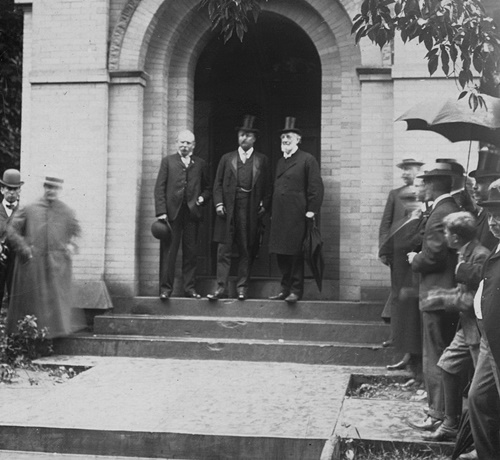
Chautauqua Institution is also notoriously the site of the stabbing of author Salman Rushdie in the summer of 2022. This year, Rushdie has published a book called The Knife: Meditations After an Attempted Murder, where he recounts the horrific incident and talks about returning to Chautauqua Institution to reclaim his peace of mind and move forward.
A Storied Beginning
Chautauqua Institution was founded in 1874 by Methodist minister John Heyl Vincent and inventor Lewis Miller to educate Sunday School teachers about religion, teaching, science, and social issues. A tent city that was accessible only by boat at the time, the school drew 20,000 people from the United States and Canada that first season. Over the ensuing years, its mission grew, and Chautauqua Institution established itself as a kind of intellectual, interfaith adult summer camp.
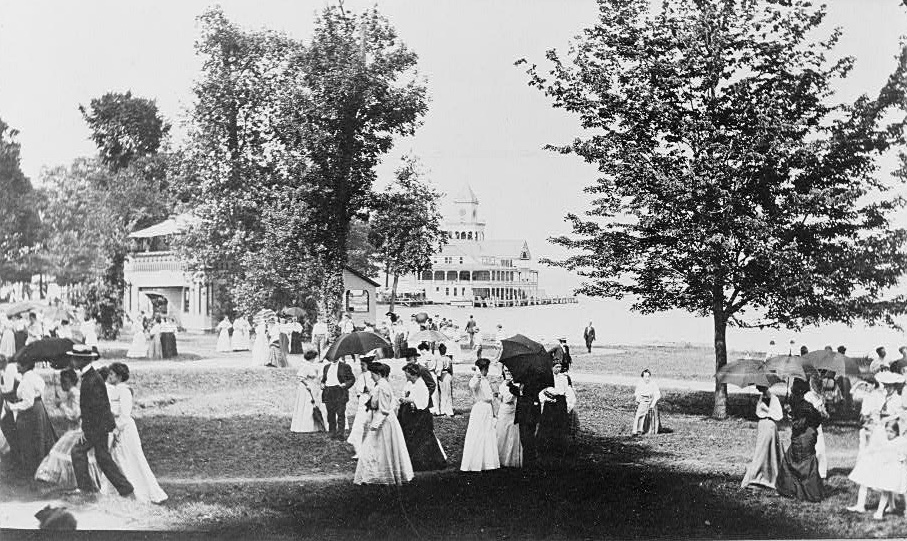
Fast forward to today: “The mission of Chautauqua Institution is to explore the best of human values through programming,” says Deborah Sunya Moore, senior vice president and chief program officer, “with an emphasis on educating, inspiring, and convening conversation.” She adds: “At our 150th anniversary, we are not just looking back, but also looking forward and amplifying voices that need to be amplified.”
The Institution’s programming consists of four pillars: arts (orchestra, opera, theater, dance, and visual arts), education, recreation, and religion. The campus amphitheater is booked six nights a week over the nine-week season with a variety of performers, from the highbrow (opera singer Renée Fleming, jazz musician Wynton Marsalis) to the popular (Martina McBride, Boyz II Men, Frankie Valli and The Four Seasons); the seventh night is devoted to interfaith spiritual services and song.

Each week has a theme. For the 150th anniversary season, the themes include the modern presidency, A.I., population explosion, the transformative power of music, and the water crisis. A special week will be devoted to celebrating Chautauqua Institution’s sesquicentennial, complete with a gathering of “mini Chautauquas” that have emerged across the U.S. and Canada and that are linked into a Chautauqua Trail. “There is no formal connection between us,” says Moore, “but we are the mothership, and these other groups were inspired by the Chautauqua Institution’s idea of taking leisure time and using it with purpose.”
A World Unto Itself
It is difficult to describe Chautauqua Institution unless you visit it, and even then, it defies a succinct explanation. Many people, like me, come to the property not knowing what to expect, says Scott Beresford, manager of group sales and programs, who gave me a tour. It is a place, but it is also a feeling. It is a little bit wondrous — in every corner, you find new things and curiosities to experience. Although Chautauqua Institution itself is a non-profit organization, there are many private homes and for-profit shops, a spa, a cinema, a library, and restaurants on the 750-acre lakeside property. The historic streets are narrow and winding, with closely packed homes of different architectural design — all lovely, with lush landscaping per the rules and regulations of the homeowners’ association.
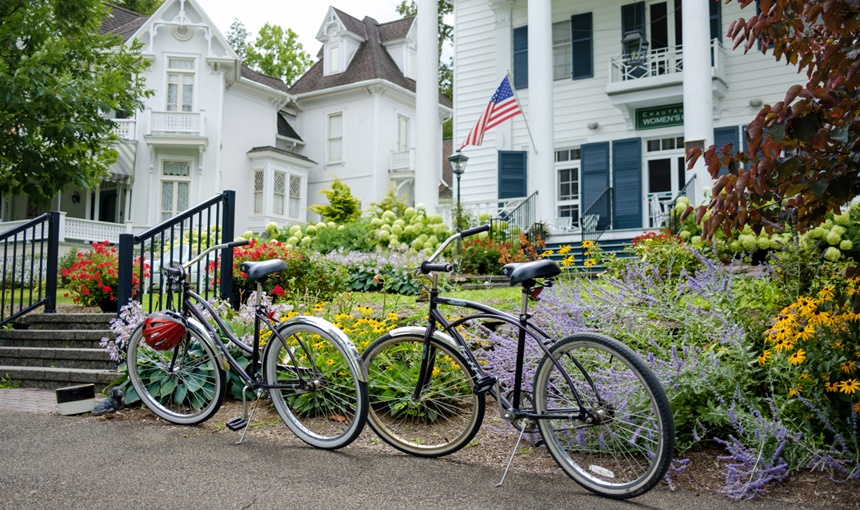
The Institution’s programming is designed to create customized experiences for children and adults. “Four people can come to Chautauqua together and follow completely different pathways,” says Moore. One person can choose to go to yoga and then a morning lecture, an afternoon workshop, and an evening concert. A second person can choose to enjoy time on Chautauqua Lake or at one of the Institution’s two golf courses. A third can take master classes and attend recitals at the School of Music. And a fourth young person can spend time at the Boys and Girls Club kayaking and doing crafts and then go to a concert at night.

“What is special about Chautauqua is that it is more than a music festival. It’s not just a lecture platform. It’s not just a park. It is all of those things and it’s steeped in learning—we offer over 300 classes every summer,” Moore says. Yet whatever a person chooses to do at Chautauqua Institution, they will be surrounded by inspiration, she notes, even if it’s just the sound of an orchestral concert floating on the evening breeze.
If You Go
Pricing and Parking
The Chautauqua Institution property is open year-round and free to enter during the off season. You may even park onsite (although that can be challenging given the narrow streets).
During the season from late June to August, car traffic is restricted, and visitors must walk, bike, or use the complimentary shuttle bus and tram services to traverse the hilly property. Sundays are free, but on other days you must purchase a gate pass ($113 for adults for one day), which allows access to the grounds and provides general admission to the Amphitheater, the Hall of Philosophy, and Chautauqua Chamber Series events. A grounds access pass is less expensive at $69 for adults and includes entry to the Amphitheater for morning worship and the Hall of Philosophy but doesn’t include any other formal activities. Single tickets can be purchased for various events, such as a specific lecture, workshop, or concert, starting at $10. Multi-day and even full-season passes can also be purchased.

Accommodations On and Off the Property
A variety of accommodations are available on the Chautauqua Institution grounds itself, most notably the historic Athenaeum Hotel, an imposing yellow Victorian structure with a wrap-around porch and a vast green lawn leading down to the lake. The literary-themed Spencer Hotel and Spa, which overlooks the main Amphitheater, is another option, as are bed & breakfasts and condo rentals.

In nearby Jamestown, the birthplace of Lucille Ball, and home of a museum named in honor of her and Desi Arnaz, as well as the site of the interactive National Comedy Center, the modern Chautauqua Harbor Hotel offers gorgeous views of the lake. Jamestown also has a variety of chain hotels to choose from.
Wherever you stay, your time at the Chautauqua Institution will undoubtedly remain with you. Once you have experienced the beauty of this quiet corner of New York State and the opportunity to elevate your mind and spirit, you may be inspired, or even compelled, to return year after year, as many do.

“There is no place like it,” Pulitzer Prize-winning historian David McCullough said about Chautauqua Institution at a lecture there. “No resort. No spa. Not anywhere else in the country, or anywhere in the world—it is at once a summer encampment and a small town, a college campus, an arts colony, a music festival, a religious retreat and the village square—and there’s no place—no place—with anything like its history.”
Nancy Monson is a freelance travel, lifestyle, and wellness writer with publications ranging from AARP The Magazine to Fodors.com, NextAvenue.org, and USA Today. She is a member of the International Food, Wine and Travel Writers Association and the Society of American Travel Writers. She is also a mixed-media artist and author of Craft to Heal: Soothing Your Soul with Sewing, Painting, and Other Pastimes.
Become a Saturday Evening Post member and enjoy unlimited access. Subscribe now
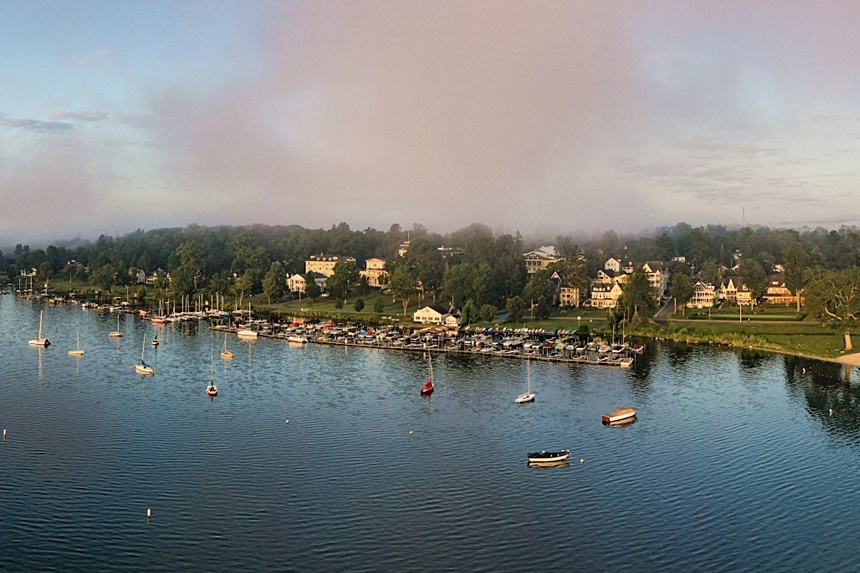
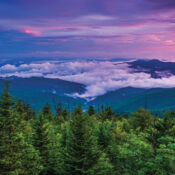
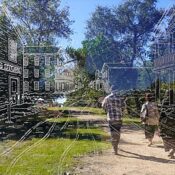

Comments
We here in Boulder, Colorado, have a Chautauqua ‘area’ in the foothills where we can hear fine outdoor summer concerts under an aging wooden auditorium that protects from rains or wildlife. Nearby there’s a summer restaurant but I don’t know that there are other educational or entertainment activities, so maybe our “Chaut” is just a remnant from earlier days where activities were greatly expanded. My impression is that it was an attempt to enrich culture when there were fewer ways to do that b/c daily life required more work & much of the U.S. was yet unsettled.
As always, I love the way SEP gives us some peeks at history.